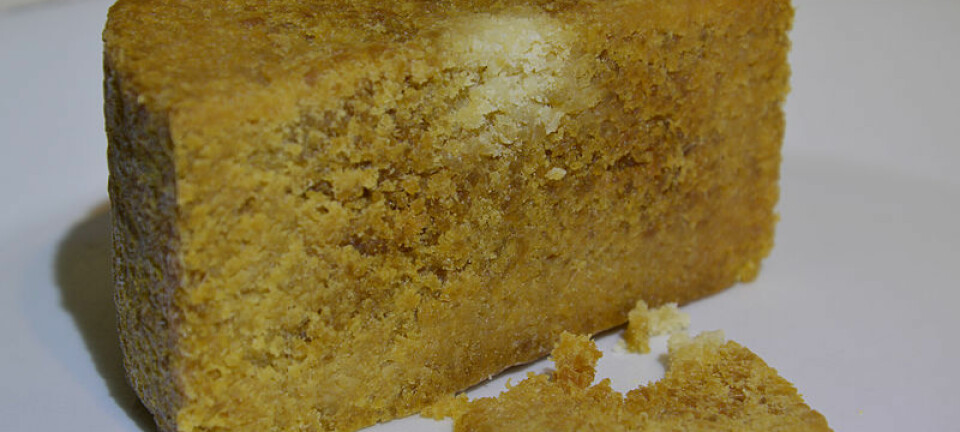
High-fat cheese can be part of a healthy diet
There may be no need to opt for low-fat option when shopping for cheese, shows new study.
We have long been advised to avoid high-fat foods such as cheese, but a new study suggests that it might not make any difference whether you add high- or low-fat cheese to your shopping basket.
The scientists conclude that high-fat cheese can indeed be a part of a healthy diet.
“This is the first time high-fat cheese has been compared to low-fat cheese so the results are exciting, but it actually doesn’t surprise me that there’s no difference,” says lead-author Farinaz Raziani, a Ph.D. student at the University of Copenhagen’s Department of Nutrition, Exercise and Sports.
The results are published in The American Journal of Clinical Nutrition.
Cheese has no effect on cholesterol
This is not the first study to show that the health impacts of cheese are somewhat different to those of other foods rich in saturated fatty acids.
Previous studies have shown that cheese has a neutral effect on cholesterol levels while butter has a negative effect.
But the new study is the first to compare cholesterol levels with cheeses of various fat content, and other indicators such as body weight, fat, insulin resistance, and blood pressure.
In the study, one group of participants ate large quantities of low-fat cheese for 12 weeks, while another group ate a corresponding amount of high-fat cheese. The results showed no difference between the participants’ health once the 12 weeks were up.
You can read more about the methods in the side story at the bottom of this article.
Calcium could be the explanation
“There’s something about cheese that makes it not as unhealthy as you would otherwise think,” says Raziani.
And this could be explained by the high calcium content of cheese, as increased calcium intake could help us excrete more fat.
“The theory is that the high calcium content in cheese can impact the uptake of saturated fats. Calcium can bind to long-chain saturated fatty acids in the gut, and limit the absorption of these,” says Raziani.
“So the effect of saturated fats on plasma cholesterol levels will be reduced,” she says, but emphasises that this explanation is still speculative.
No changes to dietary recommendations
Associate Professor Sara Eriksen from the Department of Human Nutrition at the Metropolitan University College, Denmark, thinks the results are exciting, but cautions that there is no need to change dietary recommendations just yet.
“It confirms the hypothesis that cheese has some special characteristics, which means that we don’t take up the saturated fatty acids in the same way as other food products,” says Eriksen.
“Based on these results I agree that it’s safe to include high-fat cheese as a part of a healthy diet and lifestyle,” she says.
But this is just the first study to compare cheese according to fat content, and she advises that more research is needed before guidelines should be changed.
Raziani agrees.
“Dietary recommendations are always a little conservative because we need to be on the safe side. I think that’s appropriate. Even though it looks like there’s no difference in choosing low-fat cheese over high-fat cheese, we still need more studies to confirm our results before it can be finally recommended,” she says.
Participants can make mistakes in self-reporting
The study follows a so-called parallel design, where the results could potentially have been influenced by individual variations in the participants' diet and lifestyle.
The participants self-reported their dietary patterns during the study, which means that there is always the risk of mistakes or false-reporting.
“To reduce the variation you could make a crossover study, where every participant functions as their own control,” says Raziani.
“This means that everyone eats the high-fat cheese for one period and then they change to a period of low-fat cheese. It reduces the inter-individual variation because it’s the same people that try both types of cheese,” she says.
Lifestyle factors can also affect the result
Lifestyle factors such as physical activity, smoking habits, and alcohol use can all influence the results, which the new study has not accounted for.
“In future studies it would be ideal to compare test participants according to lifestyle. This study is based on diet, and that’s fine, but diet and physical activity correlate when we’re talking about health,” says Eriksen.
“So it could be interesting to know what effect lifestyle factors have in combination with the diet,” she says.
Cheese is not necessarily healthy
But the new results are not a license to pig out on cheese.
“It’s important to stress that the study only indicates that cheese has neither a positive nor a negative effect on health. So we shouldn’t take that to mean that cheese is a super food with lots of health benefits,” says Eriksen.
Raziani agrees.
“We can’t conclude that high-fat cheese on its own has a positive effect on health. It depends entirely on what the alternative is. If you eat butter or processed meat instead of high-fat cheese, then cheese is probably the better choice. But there are, of course, healthier alternatives to high-fat cheese,” she says.
-------------
Read the Danish version of this article on Videnskab.dk
Translated by: Catherine Jex








